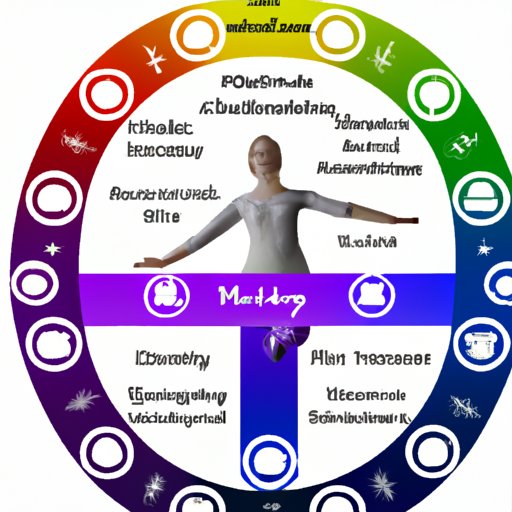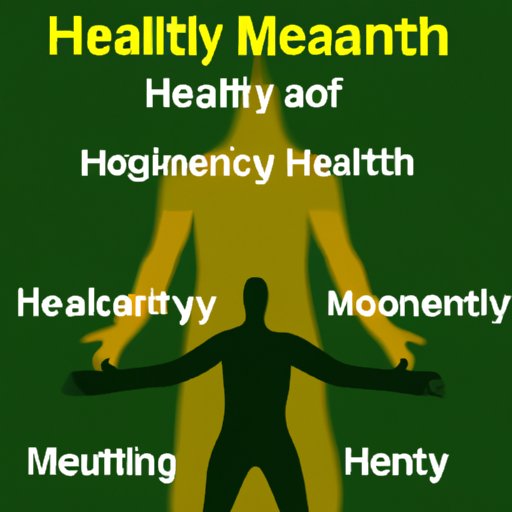Introduction
Health is a complex concept that encompasses much more than physical wellbeing. Defined by the World Health Organization (WHO) as “a state of complete physical, mental, and social well-being, and not merely the absence of disease or infirmity,” health involves all aspects of our lives. To better understand this concept, it is helpful to break it down into its seven dimensions of health: physical, mental, social, emotional, environmental, spiritual, and intellectual.

Exploring the Seven Dimensions of Health
Physical health is perhaps the most obvious dimension of health, but it is far from the only one. While physical health refers to the body’s ability to function properly, the other six dimensions are just as important for overall wellbeing. Let’s take a closer look at each one.
Physical Health
Physical health is the foundation for all other dimensions of health. It involves taking care of your body through proper nutrition, exercise, sleep, and stress management. Maintaining physical health can help reduce the risk of chronic diseases and increase your quality of life.
Mental Health
Mental health refers to a person’s psychological wellbeing. It includes managing emotions, understanding one’s thoughts and feelings, and having healthy relationships with others. Mental health also involves developing coping skills to manage stress and difficult situations.
Social Health
Social health is concerned with our relationships with others and how we interact with society. This dimension involves having good communication skills, being able to express oneself, and forming meaningful connections with people. Social health is important for maintaining strong relationships with family and friends, as well as developing a sense of belonging.
Emotional Health
Emotional health is closely related to mental health, but it is focused on understanding and managing one’s emotions. It is about recognizing and accepting feelings, both positive and negative, and learning how to express them in a healthy way. Emotional health also involves developing strategies to cope with stress and difficult emotions.
Environmental Health
Environmental health is concerned with our relationship to the environment and how it impacts our health. This dimension involves reducing our environmental impact and taking steps to protect the planet. It also includes taking measures to prevent environmental hazards, such as air pollution, water contamination, and climate change.
Spiritual Health
Spiritual health is about finding meaning and purpose in life. It involves exploring beliefs and values, connecting with something greater than oneself, and understanding our place in the world. Spiritual health is not necessarily tied to religion; it can involve any activity that helps us find peace and contentment.
Intellectual Health
Intellectual health is about using our minds to learn new things and explore ideas. It involves challenging ourselves mentally, engaging in creative activities, and expanding our knowledge. Intellectual health is important for developing problem-solving skills and critical thinking.
How to Achieve Optimal Well-Being Through the Dimensions of Health
To achieve optimal well-being, it is important to balance all seven dimensions of health. Each dimension is interconnected; if one is lacking, it can affect the others. Here are some tips for improving each dimension:
Balance All Seven Dimensions
Balancing the seven dimensions of health is essential for achieving optimal wellbeing. This means focusing on all areas of health, not just one or two. Consider how each dimension affects the others and strive to maintain a healthy balance in all areas.
Strategies for Improving Each Dimension
For each dimension, there are specific strategies you can use to improve your health. For physical health, focus on eating a balanced diet, getting regular exercise, and getting enough sleep. For mental health, practice relaxation techniques, talk to a therapist, and engage in activities that bring you joy. For social health, make time for socializing with friends and family, join a club or organization, and volunteer in your community. For emotional health, practice self-care and self-compassion, express your feelings in a healthy way, and seek support when needed. For environmental health, conserve energy, reduce waste, and recycle whenever possible. For spiritual health, explore your beliefs and values, connect with nature, and practice mindfulness or meditation. And for intellectual health, challenge yourself mentally, read books, and take classes.

The Importance of Balancing All Seven Dimensions of Health
When all seven dimensions of health are balanced, it can lead to improved physical and mental health, increased happiness, better relationships, and higher levels of productivity. According to a study from the University of Illinois, “individuals who are high in all seven dimensions of health are the happiest and most satisfied with their lives.”
A Comprehensive Guide to Understanding the Dimensions of Health
In order to achieve optimal wellbeing, it is important to understand the seven dimensions of health and how they work together to create a holistic approach to health. Each dimension has its own unique benefits and challenges, and it is important to recognize how they all contribute to overall health.
What Each Dimension Means
Physical health involves taking care of your body through proper nutrition, exercise, sleep, and stress management. Mental health refers to a person’s psychological wellbeing, including managing emotions and understanding one’s thoughts and feelings. Social health is concerned with our relationships with others and how we interact with society. Emotional health is about understanding and managing one’s emotions. Environmental health is focused on our relationship to the environment and how it impacts our health. Spiritual health is about finding meaning and purpose in life. And intellectual health is about using our minds to learn new things and explore ideas.
Tips for Improving Your Health in Each of the Seven Dimensions
Improving your health in each of the seven dimensions requires different strategies and approaches. Here are some tips for improving your health in each area:
Physical Health
Eat a balanced diet, get regular exercise, and get enough sleep. Make sure to drink plenty of water and limit your intake of processed foods, sugar, and caffeine.
Mental Health
Practice relaxation techniques, talk to a therapist, and engage in activities that bring you joy. Set aside time for yourself to relax and unwind. Avoid overthinking and worrying too much.
Social Health
Make time for socializing with friends and family, join a club or organization, and volunteer in your community. Develop effective communication skills and learn how to express yourself.
Emotional Health
Practice self-care and self-compassion, express your feelings in a healthy way, and seek support when needed. Find healthy ways to cope with stress and difficult emotions.
Environmental Health
Conserve energy, reduce waste, and recycle whenever possible. Support organizations that are working to protect the planet and its resources.
Spiritual Health
Explore your beliefs and values, connect with nature, and practice mindfulness or meditation. Spend time reflecting on your life and what brings you joy.
Intellectual Health
Challenge yourself mentally, read books, and take classes. Explore different topics and engage in creative activities.

Using the Dimensions of Health to Reach Your Wellness Goals
Once you have a better understanding of the seven dimensions of health, you can use them to reach your wellness goals. Setting achievable goals and adjusting them as needed is key to achieving success. Here are some tips for setting and achieving your wellness goals:
Setting and Achieving Goals
Set realistic and achievable goals for each dimension of health. Break down larger goals into smaller, more manageable steps. Focus on progress, not perfection, and remember to be kind to yourself if you don’t reach your goals right away.
Adjusting Goals as Needed
Be flexible and open to adjusting your goals as needed. If a goal isn’t working, reassess it and come up with a new plan. Remember to celebrate your successes along the way.
Conclusion
The seven dimensions of health—physical, mental, social, emotional, environmental, spiritual, and intellectual—are all interconnected and necessary for achieving optimal wellbeing. By balancing all seven dimensions and setting achievable goals, you can reach your wellness goals and enjoy a healthier, happier life.
(Note: Is this article not meeting your expectations? Do you have knowledge or insights to share? Unlock new opportunities and expand your reach by joining our authors team. Click Registration to join us and share your expertise with our readers.)
